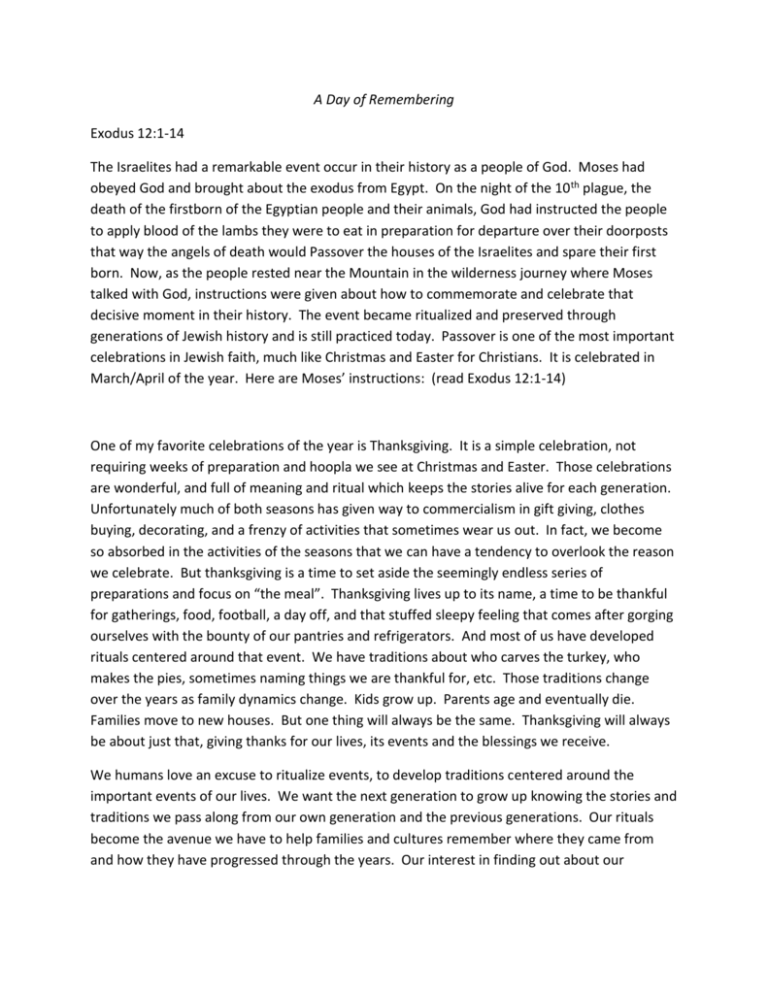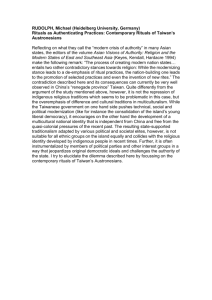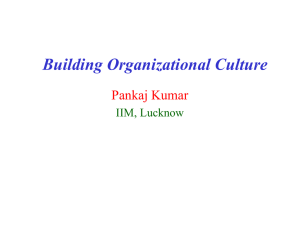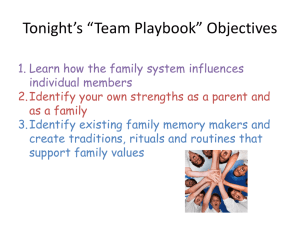A Day of Remembering
advertisement

A Day of Remembering Exodus 12:1-14 The Israelites had a remarkable event occur in their history as a people of God. Moses had obeyed God and brought about the exodus from Egypt. On the night of the 10 th plague, the death of the firstborn of the Egyptian people and their animals, God had instructed the people to apply blood of the lambs they were to eat in preparation for departure over their doorposts that way the angels of death would Passover the houses of the Israelites and spare their first born. Now, as the people rested near the Mountain in the wilderness journey where Moses talked with God, instructions were given about how to commemorate and celebrate that decisive moment in their history. The event became ritualized and preserved through generations of Jewish history and is still practiced today. Passover is one of the most important celebrations in Jewish faith, much like Christmas and Easter for Christians. It is celebrated in March/April of the year. Here are Moses’ instructions: (read Exodus 12:1-14) One of my favorite celebrations of the year is Thanksgiving. It is a simple celebration, not requiring weeks of preparation and hoopla we see at Christmas and Easter. Those celebrations are wonderful, and full of meaning and ritual which keeps the stories alive for each generation. Unfortunately much of both seasons has given way to commercialism in gift giving, clothes buying, decorating, and a frenzy of activities that sometimes wear us out. In fact, we become so absorbed in the activities of the seasons that we can have a tendency to overlook the reason we celebrate. But thanksgiving is a time to set aside the seemingly endless series of preparations and focus on “the meal”. Thanksgiving lives up to its name, a time to be thankful for gatherings, food, football, a day off, and that stuffed sleepy feeling that comes after gorging ourselves with the bounty of our pantries and refrigerators. And most of us have developed rituals centered around that event. We have traditions about who carves the turkey, who makes the pies, sometimes naming things we are thankful for, etc. Those traditions change over the years as family dynamics change. Kids grow up. Parents age and eventually die. Families move to new houses. But one thing will always be the same. Thanksgiving will always be about just that, giving thanks for our lives, its events and the blessings we receive. We humans love an excuse to ritualize events, to develop traditions centered around the important events of our lives. We want the next generation to grow up knowing the stories and traditions we pass along from our own generation and the previous generations. Our rituals become the avenue we have to help families and cultures remember where they came from and how they have progressed through the years. Our interest in finding out about our ancestors reflects that interest. It is not uncommon to see families posting genealogies online. We want to preserve our stories. For the ancient Israelites, God did not want them to forget the events that led them to the formation of an identity as the people of God. The ritual of Passover became one central event that helped them teach their children the stories of the past, so that they would maintain their identity and their faith. Likewise, we Christians developed traditions and rituals to help us remember our story, whast makes us believers and followers of Jesus. As Christmas is celebrated in our churches, the story of the birth of Jesus is told and celebrated. In the midst of the frenzy of traditions of shopping, giving, partying, the story gets told by faithful Christians of all generations. Likewise, the most important event in human history, the birth, death and resurrection of Jesus, gets told every year in worship experiences, pageants, sunrise services and celebrative singing and music. As much as culture may try to silence those stories, they are still celebrated and remembered by the faithful. One ritual that is practiced by many denominations is the act of Holy Communion. Our Communion ritual, its words, its serving, its repetitiveness serves to help us remember Jesus, who he is and what he does. In the ritualistic act of consuming bread and cup we are remembering that Jesus suffered, (His blood was poured out), was put to death, (an attempt to eliminate his body and silence him), but came back to us conquering death itself to save us from the evil that threatens to destroy us. All of this we remember as we come to receive the elements and partake in the table of everlasting life. Through our communion practices we pass that knowledge along to our children, we share the story so that the next generation will know who Jesus is and what he came to do. In this day and age it is important that we continue to teach our children, to pass the stories and the rituals along so that they will be able to pass the knowledge along and shape and form the next generation of believers. So many influences threaten to silence the story. The unbelievers have loud voices. They are speaking out. Where are our voices in the turmoil of our times? The strongest voices are in the rituals we celebrate. As we repeat the Christian history in our rituals, we are allowing God to continue to change, transform us and our families and friends so that the world finds hope and meaning in the face of such conflicting messages being given by others. The Israelites carried the story with them through the after exodus generations so that God could continue to shape and form the world and, when the time was right, birth the Savior who would bring the ultimate hope to the world. Now we have become the hope for the next generation. It is our task to help God shape faith so that hearts and minds can know where the ultimate hope lies. Jesus must always be central to our practices, rituals and traditions, because without him we have no business being church.











